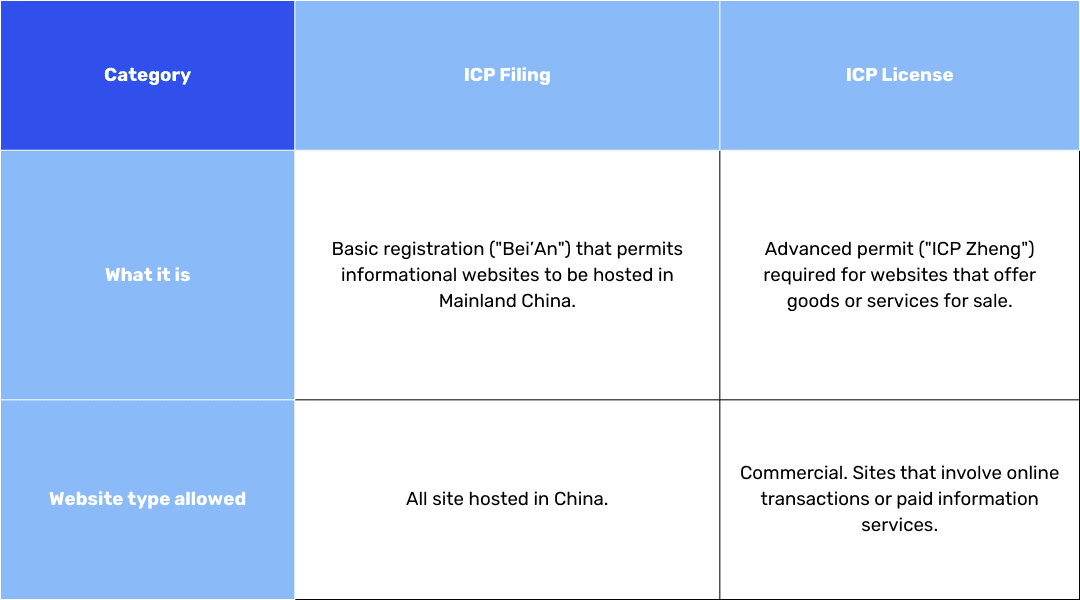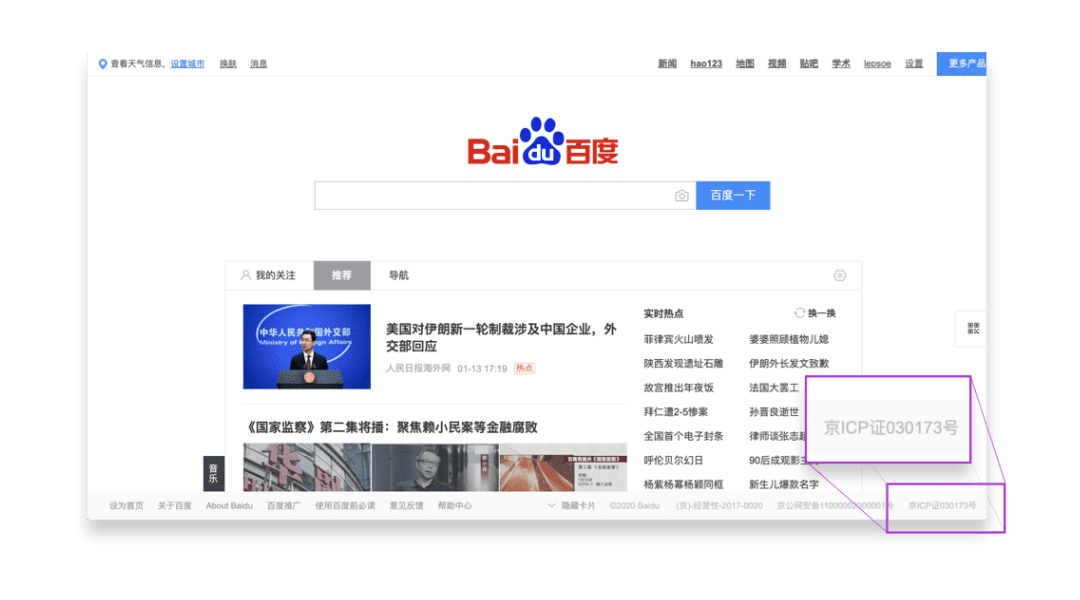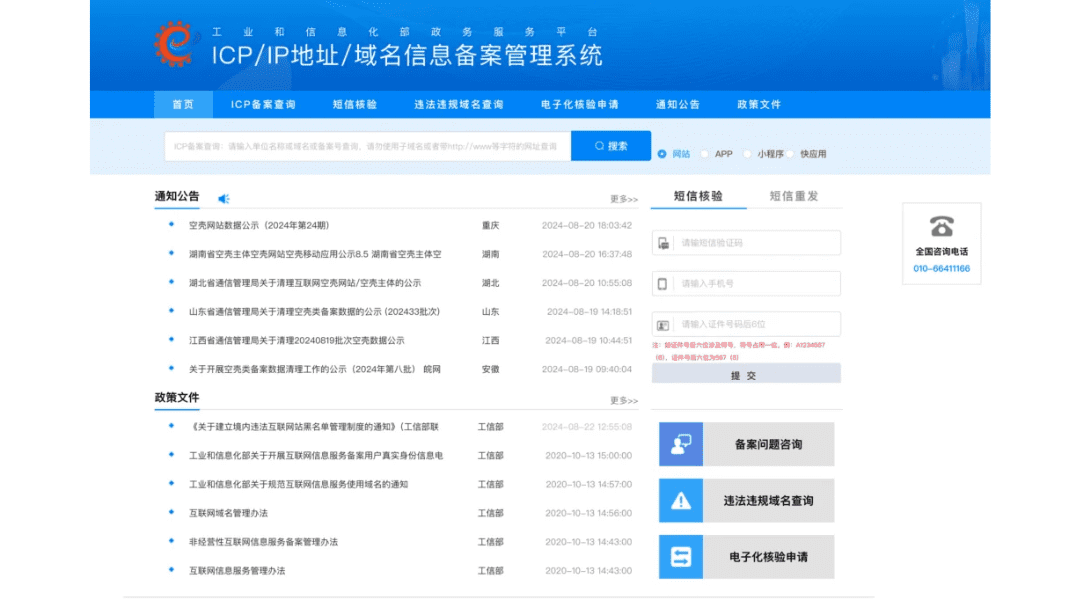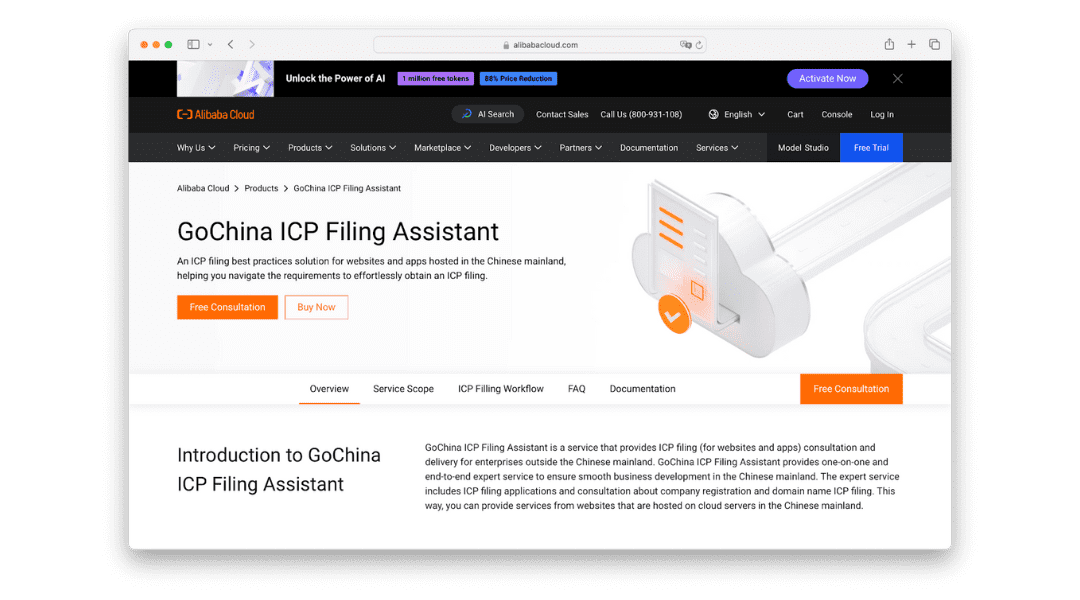1 - Expected post-Chinafy results
Does Getting an ICP Certificate Make Your Website Work in China?
Your compliance team is eyeing an ICP certificate. It’s on the roadmap, and maybe even seen as the first step before launching anything serious in China.
While an ICP certificate is important and legally required for hosting inside Mainland China, it’s often misunderstood when it comes to unlocking and resolving performance issues.
Functionally, it can be likened to a permission slip. Similar to how achieving a compliance certification* doesn’t optimize your website, similarly, the ICP registration won’t speed up your site, resolve broken third-party scripts, nor guarantee search visibility.
Getting an ICP certificate doesn’t guarantee fast website performance in China.
We’ve partnered with Chinafy’s trusted compliance partner, Lianwei Pancloud, to explain what an ICP certificate is, when one is required, and where Chinafy steps in to make your website actually work in China.
Note: The information is provided by Lianwei Pancloud, Chinafy’s compliance partner. The article is based on the available sources and aims to accurately represent Lianwei Pancloud's expertise and industry standing.
What is an ICP?
ICP, short for Internet Content Provider, is a permit system required by China’s Ministry of Industry and Information Technology (MIIT).
If your website is hosted inside China, becoming an ICP is mandatory for your site to go live legally. Once approved, your website receives an ICP certificate — a kind of license plate for your site — that must be visibly displayed in the footer, linking back to the official MIIT database.
There are two ICP certifications: ICP filing or an ICP license.


ICP license number example in footer (baidu.com)
Do I need to get an ICP certificate?
If your website is hosted in China, then yes — you must obtain an ICP filing or ICP license. This applies whether you're a local startup, an MNC, or an overseas company using a local hosting provider.
Unless you're planning to host websites inside China, the ICP doesn't apply to offshore-hosted websites.
Some companies may opt to pursue ICP for compliance reasons, such as the eligibility to use cloud services in China.

ICP/IP Address/Domain Name Registration Management System
Do I need hosting in China?
For many international companies, hosting in China is not necessary to reach users in China.
In fact, for some, hosting offshore is preferable in the early stages, especially when the compliance pathway is still being evaluated.
After the compliance evaluation, if you choose hosting in China (e.g. via an onshore cloud provider) down the line, you will need to file for an ICP certificate among other things.
How long does it take to apply for an ICP certificate?
The process typically takes 2 to 6 weeks, depending on the accuracy of your documentation and the responsiveness of the local Communications Administration.
To apply, you'll need:
A Chinese business license (or your local partner’s)
Legal representative and website admin details
Proof of domain ownership
A valid phone number and address in China
How do I get an ICP certificate?
Most hosting providers can act as the middleman between you and the MIIT. For example, if you’re using hosting services on Aliyun (Alibaba Cloud’s onshore arm), then you will need to go through its GoChina ICP Filing Assistant.

Alibaba Cloud’s ICP Filing Assistant (Source: Alibaba Cloud)
You can apply directly, but this route assumes your team is fluent in Chinese and based in China. It’s possible, but not commonly chosen by global teams due to regulatory and language complexities.
Agencies like Lianwei provide full end-to-end support — from document preparation to submission and coordination with authorities. This is often the most efficient route, especially for companies without a local compliance team.
Can an ICP certificate make my website faster?
No. An ICP certificate is a regulatory requirement, not a technical solution.
However, it unlocks access to China-based hosting and CDN services, which when configured correctly, can significantly improve site performance.
If you do not have an ICP certificate, there are alternative ways to achieve improved speed and functionality that do not require onshore cloud services. More on that below.
Will my website become inaccessible in China without an ICP certificate?
If your site is hosted in China (i.e. using servers located inside China), it needs an ICP certificate to be compliant. That said, even if it is hosted, compliantly in China, it may still encounter speed and functionality issues.
If your site is hosted outside China, your website could still be accessible in China. However, it may still be slow, partially loaded, or unstable due to compatibility issues with China’s internet infrastructure.
The good news is, in both cases - that’s where Chinafy comes in.
How does Chinafy work with websites hosted outside of China?
Chinafy helps businesses deliver a fast, fully functional website in China with the stack as-is.
In other words, Chinafy bolts onto your website whether or not the website is hosted in China because functionally, they are separate things
Rather than rebuild your website from scratch, Chinafy takes your existing site to re-engineer a China-optimized version on an ongoing basis.
Here’s how it works:
Chinafy scans, identifies, and addresses inaccessible or slow-loading components with its proprietary China web optimization suite.
Chinafy then bolts your website onto a China-friendly CDN to achieve additional speed gains.
Chinafy routes China-based traffic to the Chinafy-optimized version of the website to be served under the same domain as your original site.
More about how Chinafy works
Does Chinafy optimize websites for companies with an ICP certificate?
For companies that already have an ICP certificate and host in China, Chinafy helps you get more out of your infrastructure.
Chinafy works with what’s already in place. Whether your site is hosted on Alibaba Cloud, Tencent Cloud, or another provider, Chinafy can bolt onto it to accelerate site speed through smart caching and optimization.
Chinafy improves compatibility by reconfiguring third-party resources that typically slow down or break in China either by replacement, removal, or other optimization methods. China-hosted websites can still face challenges with third-party scripts, global assets, or heavy content libraries.
Banyan Tree, a Singapore-listed global hotel chain, leveraged Chinafy to significantly accelerate the performance of its onshore-hosted website in China.
The result? A 4.5x faster website that remained hosted onshore and managed in China.

Read the full case study here
In short, an ICP certificate is a legal necessity for websites hosted in China but doesn’t equate to better performance or accessibility. It’s simply a compliance requirement to qualify a company to use onshore services.
To truly optimize your website for China, whether or not you have an ICP certificate, focus on performance and compatibility. Tools like Chinafy can help ensure both speed and stability.
Not sure if you need an ICP certificate? Start with what matters: your business goals and your current stack. Whether you're still exploring the market or applying for an ICP certificate, the best next step is a conversation.
Click here to get started with a free evaluation
About Lianwei
Lianwei Pancloud is a leading cloud management and compliance provider in China. With over 20+ years of experience and clients spanning the Global 500, they specialize in cloud security, regulatory filings, and data compliance. As official partners of Alibaba Cloud, AWS, and Microsoft Azure, they bring both proven credibility and practical execution to complex regulatory processes from technical security implementation to compliance including ICP registration.



1 - Expected post-Chinafy results






























